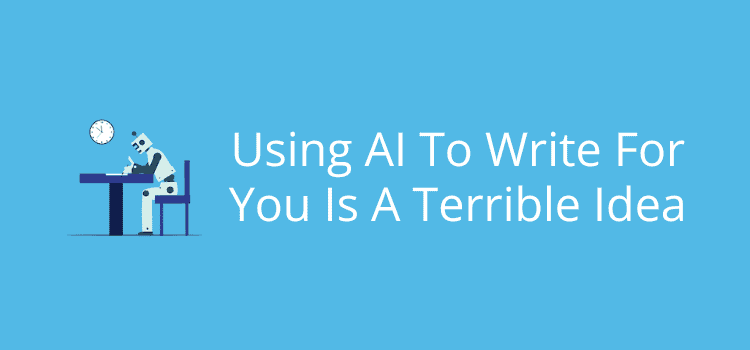
Almost everyone is familiar now with AI (artificial intelligence) and its ability to provide answers, create images, and even videos.
For writers, however, the ability of AI to produce text is the most worrisome. All it takes is a quick prompt, and it can output 1,000 words on any topic in seconds.
Naturally, this creates a temptation to take a quick and easy shortcut. Why spend hours writing yourself when an AI tool can produce a grammatically correct and readable text in seconds?
Well, the answer to that question is up to you. Do you place more value on your creativity or productivity?
The usefulness of AI tools
If you have used AI, you have to admit that it can do some pretty amazing things.
It seems as if the only limitation is your ability to provide appropriate prompts.
You might need an eye-catching feature image for an article or blog post. In seconds, you get the job done.
Is it cheating?
Well, no, not really, because bloggers and content writers have relied on free stock images for years. So what’s the big difference?
When you are stuck for ideas or topics to write about, AI can spit out hundreds of ideas for you in seconds. It can even give you an outline of a story for fiction writers.
Before AI, writers used other means, such as search engines or writing prompt sites, to help them generate ideas.
Again, it’s not such a big difference, except that AI offers a much faster way.
From the viewpoint of speed and efficiency, yes, AI is impressive. But only as far as research, idea generation, and image creation are concerned.
However, when it comes to using AI to generate your articles, blog posts, short stories, poems, or even an ebook, that’s the line that crosses the divide between being a writer and an AI copy-and-paste artist.
What you lose when you let AI do your work
Your writing is you.
When you hand over your writing to a clever machine, it will never be you.
AI has no way of imitating your phrasing, vocabulary preferences, style, or idiosyncrasies.
It also has no knowledge about your readers.
Sure, you can try to give an AI writing tool some hints about your readers’ demographics.
But it will never replace your understanding, which you accumulated through communicating with your readers.
Writing is not only about delivering words and information. It’s far more personal and only works when it’s your writing from your mind.
Your writing voice is unique and your most valuable tool.
Another loss is your experience, expertise, and knowledge.
You can’t train a machine to access everything you have learned in life.
Things that made you laugh, cry, get angry, frustrated, or embarrassed are irreplaceable because only you have these memories to call upon in your writing.
I’m only up to about 500 words so far in this article, and it’s taken me over an hour and a half to get this far.
In that time, I could have generated this article and probably ten more.
But what would be the point in doing that? It would only be words.
Readers can tell the difference
AI writing has been around for long enough now for readers to notice.
They might not know why, but often simply sense that something is not right.
On Reddit, I’ve seen a lot of comments saying, “Thank you, ChatGPT,” when a post is too long, too accurate, and too well-written.
AI-generated writing is almost always error-free from a writing stance, but it usually lacks emotion, controversy, humour, or subtlety. In other words, the human touch.
Sure, you can follow the advice that you can edit and personalise an AI text. But it’s rarely effective, and in many ways it is more time-consuming than writing from scratch yourself.
Don’t worry. I’ve tried it many times, and the results have always been inferior and not worth publishing.
Another aspect to consider is that your readers can generate long and detailed answers to their questions from AI tools like ChatGPT and Gemini.
So, what’s the point in publishing what they can quickly access themselves?
Error-free writing, but with errors

One of the biggest weaknesses of AI is still the output of inaccurate facts or misinterpretations.
A few days ago, I was searching for information about crane flies. If you don’t know, a crane fly is an insect with extremely long legs but a very short life span.
However, Google’s AI Observations gave me information about cranes (the bird) and fly fishing. Not so clever.
ChatGPT was a little more helpful, but by no means totally accurate.
This has been a continual problem with AI. When it doesn’t know the answer, it will often invent one, instead of saying, I don’t know.
Hallucinating is the expression commonly associated with the problem.
It’s pretty easy to spot when asking a specific question, but much harder to identify when generating very long texts.
If you use AI to generate writing for you, it’s because you are in a hurry to produce content: too much of a hurry to check and cross-check the accuracy of facts and figures.
However, your content still has your name attached to the byline, so readers will count factual errors against you, not AI.
AI offers some useful tools
You can’t stop the progress of technology, and if you don’t follow it, you will be left behind.
But that doesn’t mean that you have to use everything.
While I believe that publishing AI-generated content is a terrible idea, I still use AI tools to help me write more productively.
I’ve paid for an expensive grammar checker subscription for years, but now I can use free AI tools to do pretty much the same job.
Other tools I use are to generate ideas, research topics, create images, and assess readability.
I might be getting a bit long in the tooth, but I enjoy the challenges and opportunities that technology offers. But, within reason.
Conclusion
As a writer, I’m always open to technology helping me. Otherwise, I would still be using a typewriter and carbon paper.
But when it comes to using technology to replace me and my writing, that’s a different story.
It’s a misplaced belief that AI can write for you. It can’t. It can’t be you.
It’s only the ability of AI to write long-form answers and text that gives the impression that it can write. Sure, it can produce thousands of words in seconds, but that isn’t what writing is about.
Remember that the A in AI stands for artificial, which by definition means that it is not real.
Don’t fall into the trap of taking a shortcut and becoming a fake writer. Be you, and true to yourself and your readers, no matter how long it takes.
Related Reading: Outdated Grammar Rules You Can Probably Ignore Now
Share This Article



I agree wholeheartedly, Derek!
Thanks for the great article!
I agree. As a teacher it’s been hard to watch students give up their voices to these machines. But essay standardized tests have already made them feel like their voices don’t matter (only form).
As a writer, though, I am careful not to use A.I. for editing or other creative help because it “feeds” the machine my work. I don’t want someone else asking chatgpt to write a story and it spit out mine.